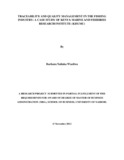Traceability and Quality Management in the Fishing Industry: a Case Study of Kenya Marine and Fisheries Research Institute (Kisumu)
| dc.contributor.author | Wasilwa, Barbara Naliaka | |
| dc.date.accessioned | 2013-03-01T04:35:03Z | |
| dc.date.issued | 2012 | |
| dc.identifier.citation | MBA Thesis | en |
| dc.identifier.uri | http://erepository.uonbi.ac.ke:8080/xmlui/handle/123456789/12649 | |
| dc.description.abstract | A field study of how traceability relates to quality management was conducted at KMFRI – Kisumu, this is a research institute that covers all the Kenyan waters. The process from catch to transportation up to the shipping company is followed and recorded through a traceability system that has been developed to trace back and forward the history of fish products. High quality and safe products are as a result of an effective quality and traceability system. This research is based on the assumption that there are various potential drivers of an organization’s investments into traceability systems; food traceability has become an essential and effective way in food quality and food safety management systems around the world. The main objective of this research was to identify the relationship between traceability and quality management in the fishing industry. The research found out that 89 % of the respondents believed that traceability has influenced the handling quality of fish products at landing sites, while 91% believed that there is improved product quality due to traceability and quality mechanisms employed at the fish factories. This shows that in deed there is a relationship between fish traceability and the quality management of fish products | en |
| dc.description.sponsorship | University of Nairobi | en |
| dc.language.iso | en | en |
| dc.subject | Trimethylamine Oxide | en |
| dc.subject | Hazard Analysis | en |
| dc.title | Traceability and Quality Management in the Fishing Industry: a Case Study of Kenya Marine and Fisheries Research Institute (Kisumu) | en |
| dc.title.alternative | en | |
| dc.type | Thesis | en |
| local.publisher | School of business | en |

